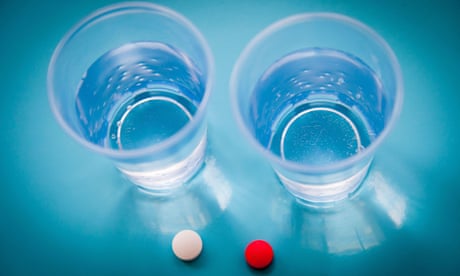Linda Buonanno had suffered 15 years of intense cramps, bloating, diarrhoea and pain she describes as “worse than labour”. She was willing to try anything to get relief from her irritable bowel syndrome (IBS) and leapt at the chance to take part in a trial of an experimental new therapy. Her hope turned to disappointment, however, when the researcher handed her a bottle of capsules he described as placebos containing no active ingredients.
Nonetheless, she took the pills twice daily. Four days later, her symptoms all but vanished. “I know it sounds crazy,” says Buonanno, of Methuen, Massachusetts. “I felt fantastic. I knew they were just sugar pills, but I was able to go out dancing and see my friends again.”
Placebos have a reputation problem. It is widely believed they are only effective when those taking them are deceived into thinking they are taking real drugs. As such, prescribing dummy or fake treatments is unethical. Yet in Buonanno’s case there was no deception. And she is not alone. A review of five studies, involving 260 patients, published last month found that “open-label” placebos – those that patients know contain no active medication – can improve symptoms in a range of conditions. This growing body of evidence raises a number of important questions. How do open-label placebos work? Which conditions do they work for? And should doctors prescribe them?
Dr Jeremy Howick first began asking about placebos when a herbal doctor suggested he drink ginger tea to combat cat allergy symptoms. He was highly sceptical, but three days later his runny noses, sneezing and insomnia stopped. Twenty years later, Howick is a clinical epidemiologist at the University of Oxford. Last month, his group published a review of previous research that has compared the effects of giving patients open-label placebos with no treatment.

The first was led by Professor Ted Kaptchuk, of Harvard Medical School, who gave 80 IBS patients, including Buonanno either no treatment or open-label placebo pills. He found those who took placebos for three weeks experienced greater improvements in symptoms, including less severe pain. Sadly for Buonanno, when the study ended she was unable to obtain further effective placebos and her symptoms returned.
In another of the studies in Howick’s review, chronic lower back pain patients openly given dummy pills to add to their existing treatments reported an average 30% pain reduction. In the three other review studies, people given open-label pills reported reduced symptoms for depression, lower back pain, and attention deficit hyperactivity disorder.
Howick acknowledges that a limitation of these trials is that participants knew whether they were getting placebos or not being treated. Yet other research has demonstrated placebos trigger real physiological changes. They are known to increase the circulation of endorphins, the body’s own natural painkillers, and of dopamine, a neurotransmitter associated both with pleasurable activities and perceptions of pain.
Placebos appear to work only in certain circumstances. Research suggests they can be effective when the brain and perception can help modulate symptoms such as pain, fatigue and itch. Dummy pills also vary in their effectiveness according to genetics. A 2012 study found IBS patients differ in their sensitivity to placebos based on the variants of a gene called COMT they had, probably because this can affect their dopamine levels.
So if ethically given placebos can work, surely doctors should be prescribing them? “I’m not advocating doctors handing them out like Smarties,” says Howick, whose book Doctor You, about overmedicalisation and the body’s self-healing capabilities, will be published later this year. “I do think, however, that this research is telling us we should start to recognise the benefits of doctors being realistically positive when they talk to patients.”
Kaptchuk is more enthusiastic about wider open-label placebo use, despite antipathy among doctors. “If enough of these studies have positive results in different conditions, I hope we can convince the medical community that there’s something useful here.”

The placebo effect: is there something in it after all?
That might be more likely once more work has been done to explain how open-label placebos work. One hypothesis is that patients who have previously got better after being treated by trusted doctors might experience subconscious boosts to levels of endorphins and neurotransmitters, thereby improving their symptoms. This is the conditioning effect, made famous by the Russian psychologist Ivan Pavlov, who trained dogs to salivate when they heard a buzzer they associated with being fed, even when no food was presented.
Another possibility is that patients might be told that placebos have worked before for people with their conditions, leading to a conscious expectation of improvements, resulting in chemical releases that relieve their symptoms.
Both of these probably play a role, yet Kaptchuk says neither can fully explain the experiences of participants in his IBS study, most of whom had been through multiple failed treatments. He thinks a relatively recent theory called embodied cognition is closer to the mark. This suggests that the possibility of improvement can trigger subconscious signals to pass between different parts of the body, resulting in chemical releases that alleviate symptoms.
Buonanno, meanwhile, has some thoughts on the potential mechanisms of open-label placebos, but is more interested in the fact that they have worked for her. Since late last year, Kaptchuk and his gastroenterologist colleague Anthony Lembo have been prescribing them to her as a patient. “I feel perfect,” she says. “It’s like I was never sick. I think it’s something to do with having confidence in my doctors, in the way they tell me it’s going to work, having hope and really wanting something to work. I don’t really understand it. But what I do know is that, after 23 years, I’ve got my life back.”
No comments:
Post a Comment